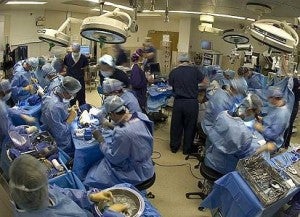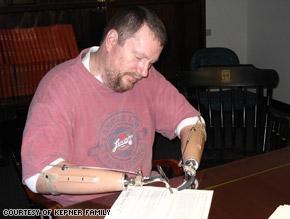Ten years ago, Jeff Kepner lost both his hands and feet to a bacterial infection. Today, he is recovering from the first US double hand transplant surgery. Soon, he’ll be able to hold his daughter’s hand for the first time in a decade.

Kepner, a 57-year-old pastry chef living in Georgia, got his new hands after a nine-hour surgery at the University of Pittsburgh Medical Center. He is still recovering, but has strong circulation in both hands and has showed no signs of organ rejection. The success of his surgery is in part due to a unique new procedure to improve an organ’s chance of being accepted by the body.
Whenever an organ transplant takes place, doctors have to suppress the recipient’s immune system so that it does not reject the new organ outright. This suppression requires toxic drugs that can increase the chances of infection, cancer, diabetes, or other complications. But in the past decade, an innovative procedure has been used to reduce the need for such drugs while still minimizing the likelihood of rejection. Used during Kepner’s transplant, the procedure transplants stems cells from bone marrow into the donated organs, helping the immune system more quickly recognize the hands as part of the body.
Kepner has a long road ahead of him. He’ll need extensive physical therapy before he can use his new hands effectively. This is because when limbs are lost, the areas of the brain responsible for their control get shifted on to other functions. But there’s good news: doctors have recently shown that by reconnecting the nerves to the hands, the motor cortex recognizes their presence and can regain control. It’s not exactly plug-and-play, but the plasticity of the brain will improve Kepner’s ability to use his new hands over time.
The donated hands came from 23-year-old Jeff Keen, who died in an unspecified accident. As an organ donor, Keen’s liver, kidneys, heart, and one lung have already found new homes in five different recipients. Not only that, but his hand donation has made medical history. This was the first double hand donation in the US, and the ninth worldwide. Even single hand transplants are a pretty rare and recent procedure, with the first successful case in the US taking place in 1999 (there have only been six since). It’s an amazing thing how far organ transplants have come, and hard to imagine the future benefits they might still have in store.

As we’ve reported in the past, prosthetic technologies are constantly getting better and better. Soon, a prosthetic limb could respond directly to the motor-sensory cortex, providing the same feeling and control as a natural limb. The day will soon come that prosthetics will be so well designed and integrated into the body that many folks will prefer them to natural limbs. But for many people, even a fully functional prosthetic could never replace the real thing, psychologically speaking. Procedures like these transplants show the amazing strides we’re taking to improve the quality of life for amputees.
Our ability to grow new organs in a laboratory setting has increased by leaps and bounds in recent years. Soon, you’ll even be able to custom-order an organ from the company Tengion. At some point in the near future, growing a new hand might be a real possibility, cutting out the need for transplants between individuals and all the risks of rejection that come with.
But until these practices become safe and widespread, organ donation will continue to prove itself a public good, especially as our ability to perform successful transplants continues to increase. Unless you’re an Egyptian pagan, you probably won’t need your organs after the lights go out. So right now, look down at your hands, and imagine them making pastries with their new owner long after you’re dead. Isn’t that kinda cool?
So what’s it say on your driver’s license?



